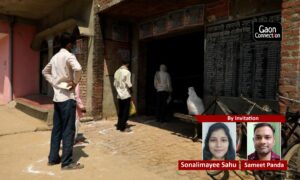In mid-1960s, there was a time when people were dying due to starvation after the drought in 1965. A place named Bijakhaman (Bija is a tuber plant) in Komna block of Nuapada in Odisha provided food to a lot of villagers. People from the nearby villages daily collected tubers from the forest and survived the severe drought. Up to five-feet long tubers were loaded on bullock carts and transported to villages to save many lives.
But, with time the forest department took complete control over those forests. Cutting of all those plants that once saved many lives was followed by burning down the area to clear it for plantation.
Today you can’t find any of those tubers there! Following silviculture, teak has been planted all over. Because of which not only has the food security been impacted, but the domestic animals also get no fodder. Local villagers have failed to benefit from the teak plantations.
Also Read: Tribal communities dependent on forest produce seem to have fared better in the pandemic
Bijakhaman is just one example of how forest dwelling communities have been separated from their traditional habitats (forests). And this has negatively impacted both the Adivasi communities and the forest cover.
Forest Rights Act
The Indian government acknowledged the historical injustice towards the tribals and other traditional forest dwellers and hence enacted The Scheduled Tribes and Other Traditional Forest Dwellers (Recognition of Forest Rights) Act, 2006. Popularly known as the FRA (Forest Rights Act), 2006, the aim of this central act is to amend the historical injustice and recognise the rights of these communities on the forests and forest resources.
Community forest resource rights are at the heart of this legislation. Pradip Prabhu from the Kashtakari Sangathana in Maharashtra, which works with tribal farmers, believes this entitlement, if provided to all, can change the picture of India. It can help address the environmental crisis, forest degradation and food insecurity.
The FRA, if implemented in both letter and spirit, can assure food security to scheduled tribes (STs) and other traditional forest dwellers (OTFDs). Even the Swaminathan commission has recommended access of tribals and pastoralists to the forests and common property resources.
Struggle of forest dwelling communities
Jami Jangal Mukti Andolon, a community-based organisation comprising STs and OTFDs in Nuapada, has been fighting for the rights of tribals and forest dwelling communities for the past two decades. Before 2006, in situ settlement of the encroachments done pre-1980 was a matter of concern. But nobody was settled through it or got any benefit. Only in a few places of India people have benefitted from it.
As a result of the struggle by Jami Jangal Mukti Andolon, more than 7,000 tribal people in Nuapada have now got individual forest land titles under the FRA. But, no other traditional forest dwellers (OTFDs) have got any entitlement even after several claims.
Also Read: Conflict in Odisha’s forests leaves both elephants and humans in grief
In September 2019, after a month-long agitation in front of the collectorate, Nuaguda village got its community forest resource rights (CFRR) entitlement from the administration. In that protest, villagers from several other villages participated to express their solidarity. The agitation was called off after the district authorities gave an assurance that each month five villages would get their community forest rights after field visits by the forest department.
However, the same has not been implemented and the forest department is blaming the COVID19 pandemic and lockdown for the delay. Villagers are also not being allowed to hold protests.
Tribal villagers launch protests
Meanwhile, inhabitants of villages that have been demanding their community forest rights held several meetings and arrived upon a decision that no forest official would be allowed in their villages unless their community rights under the FRA are settled in accordance with the 2019 agreement. The officials are, however, allowed entry into Nuaguda as that village has received its community forest rights certificate. Posters saying no entry of forest department can be seen in several villages.
Also Read: The Odisha Forest Department demolishes homes of 32 tribal families amid the lockdown
Recently, on July 24 a big meeting was organised in the Nangalbod village under Sinapali range office. Khariar’s MLA (Member of the Legislative Assembly), Adhiraj Mohan Panigrahi, also joined it in solidarity and assured that he would highlight the issue of villages not receiving community forest rights in the state legislative assembly.
Meanwhile the struggle of tribal and forest dwelling communities in Nuapada continues. According to Hiralal Majhi, leader of Jami Jangal Mukti Andolon: “The more time the implementation of the FRA takes, the more furious and stronger this movement will become. In the upcoming panchayat elections this issue can be a determining point.”
Every attempt to end this movement of tribal villagers to get their community forests rights is visible in Nuapada. According to Hanuram Majhi, founder-president of Jami Jangal Mukti Andolon, “We have been living in these forests for generations. Forest department can’t evacuate us from here at any cost.”
Chaitansingh Majhi from Nuaguda added, “We worship forest. By taking it away from us the government is separating mother from her children.”
Sunani is pursuing Masters in Social Work from University of Delhi. He hails from a village in Nuapada district of western Odisha. Views are personal.


















